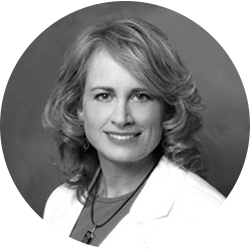supported by


Cathleen M. McCabe, MD
Dr. McCabe is a cataract and refractive specialist practicing at The Eye Associates in Bradenton and Sarasota, Florida.
Please share with us your background.
I grew up in New Hampshire; studied marine biology in undergraduate school in Florida, where I met my husband; and briefly studied sea turtle physiology in graduate school before deciding to go to medical school. I did my medical school training at the Medical College of Wisconsin.
After completing my residency training at Bascom Palmer Eye Institute in Miami, Florida, I entered private practice in Fort Wayne, Indiana, where I had a busy referral-based cataract and refractive surgery practice. In 2010, I moved to Sarasota, Florida, where I joined my current multispecialty practice, The Eye Associates. My practice focus is cataracts, refractive surgery, and refractive cataract surgery.
I have five children and two grandchildren, and I love living on the west coast of Florida.
What is the focus of your current research?
My main focus is on new lens technologies, perioperative pharmaceuticals, dry eye treatment, sustained methods of drug delivery, and microinvasive glaucoma surgery (MIGS) devices.
What has your experience been collaborating with industry?
One of the most exciting and rewarding aspects of my career has involved research, often in collaboration with industry. By participating in clinical research, we are able to offer new technologies to our patients, many times allowing them to benefit from therapies and devices that are not readily available or that they are unable to afford. Study examinations can be more comprehensive and more frequent, and patients will often develop a relationship with the study team, facilitating their care and motivating compliance with treatments. For some patients, having the perioperative drugs provided while enrolled in a study can be very helpful. As the physician, it is exciting to see patients benefit from cutting-edge treatments sooner than they might otherwise. Having experience with technologies that are emerging or under investigation helps inform my clinical and therapeutic decision-making as well.
Another aspect of my career that has been enhanced by interaction with industry is the ability to share ideas and collaborate with others while participating in advisory boards. In the process of providing a company with feedback on marketing or research ideas, the participants of the board exchange pearls, experience, and perspectives in a small group environment. I find these meetings to be very rewarding and often believe that I come away more informed, more educated, and more excited about my practice. It really is a two-way street, with both industry representatives and the physician participants learning from each other.
One of the aspects of medicine I also enjoy is teaching. Through industry collaboration, I have had the opportunity to interact with residents and colleagues during wet labs, lectures, and small group discussions. Again, the ability to share experiences, ideas, pearls, and challenges in a more intimate, educational environment is exciting and stimulating. I have not lived in a location where I have had access to a local teaching institution, but my involvement with industry has allowed many opportunities to teach and learn.
We all have ideas: a creative new device to develop to solve a problem, a question to be asked, a new way of measuring or treating a disease process. My interaction with industry has enabled me to design new instruments, try new applications of a device or drug, and interact with engineers and scientist to answer questions related to individual products. Partnering with industry has allowed me access to tools and expertise I would not have on my own.
I think that industry and physicians must work together if we are to make significant leaps forward in technology, devices, and pharmaceuticals with the mutual goal of helping our patients.
In your opinion, how is the role of women in ophthalmology evolving?
Over the past few years, I have seen an increasing interest and focus on involving women in more leadership positions in ophthalmology. There is a recognition of the change in demographics of newly trained ophthalmologists and a real desire to have speakers, board members, committee chairs and participants, and thought leaders include women. And there are so many experienced, dynamic women physicians who can and should be active participants. I think it is a very exciting time to practice our specialty.
What, if any, hurdles do you feel women in healthcare still face?
There are still some organizations, meetings, and groups that have infrequent or no participation by women. I am looking forward to a time when the composition of these establishments reflects more than one or two women and, instead, looks more like the overall representation of women in our field. Some of the hurdles along the way to this goal include difficulties in managing competing demands for time and energy and a need for strong mentorship of women who are earlier in their careers by those with more leadership and speaking experience.
What advice can you offer to young female ophthalmologists who are still in training or just beginning their careers?
Be bold. Get involved. Reach out to those who are doing what you envision yourself doing later in your career. Don’t be afraid to ask for advice from others or to ask for the opportunity to participate. Realize you have a unique perspective and, as such, always have something to contribute to the conversation.
Can you propose a unique or creative idea that may help women in ophthalmic practices?
There are many, many ways to practice medicine and ophthalmology. As the future of medicine becomes increasingly complex, we are going to have to be more educated on the business of medicine. In my community, there are groups of women business leaders that are coming together to support one another. I think involvement in local groups like this helps to build relationships in the community that, in turn, build your practice and increase knowledge and skills that are more business-related, an area that is often not emphasized in medical training.


